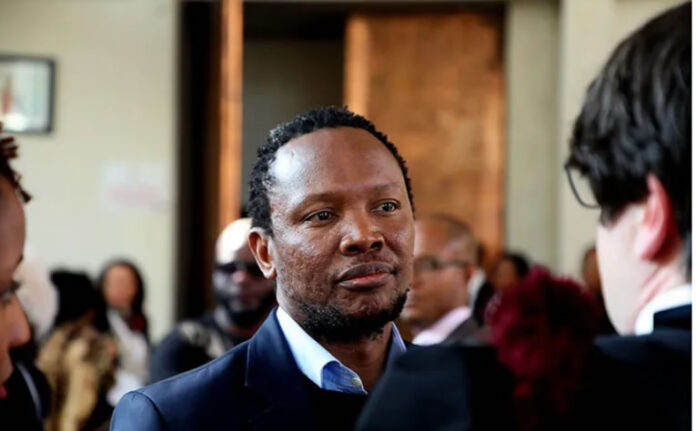Twenty-five years later, Vodacom finally pays “Please Call Me” inventor Nkosana Makate
After a legal battle that stretched across nearly two decades, Nkosana Makate — the man behind the “Please Call Me” idea — has finally received compensation from Vodacom, 25 years after first pitching the concept.
The settlement amount has not been disclosed, but analysts estimate the payout could range between R350 million and R700 million, based on Vodacom’s own earnings guidance. The confidential agreement brings to a close one of South Africa’s most drawn-out and closely watched legal battles between an individual innovator and a corporate giant.
Makate’s case was not about who owned the intellectual property behind the idea, but whether Vodacom had made a verbal promise to compensate him if the product succeeded. It was this oral agreement, made back in 2000, that would underpin 18 years of litigation and two landmark Constitutional Court rulings.
The birth of an idea
In late 2000, while working as a trainee accountant at Vodacom, Makate found himself struggling to reach his girlfriend, who lived far away and could not afford airtime to call him. Out of that frustration came a simple but transformative idea — a free service that would allow one person to send a message requesting a call back.
At the time, South Africa’s most popular mobile phone was the Nokia 3310, and mobile data was still a luxury. Mobile operators were eager for innovation, and Makate saw an opportunity to make communication more accessible.
He pitched his idea to a senior colleague, who referred him to Philip Geissler, Vodacom’s then head of product development. Geissler immediately recognised the potential and promised to test it. If successful, Makate would be compensated — a handshake deal that would later define a generation of intellectual property disputes in South Africa.
“Please Call Me” takes off
The service was launched in early 2001 under the name “Call Me”, and its success was instant. Vodacom’s internal newsletter from March that year publicly credited Makate for the idea, stating:
“Vodacom has launched a new product called ‘Call Me’, thanks to Kenneth Makate from our finance department. Kenneth suggested the service to the product development team, which immediately took up the idea.”
The newsletter also quoted Vodacom’s then managing director, Andrew Mthembu, saying:
“Most impressive to me was the fact that the idea of the product came from one of our staff members, whose job is not in any way related to product development.”
On its first day alone, 140 000 customers used the service — and it quickly became a core feature of mobile communication in South Africa. Despite the internal acknowledgment of his contribution, Makate never received a cent for his idea.
A fight for recognition
Makate left Vodacom in 2003, and two years later, he launched legal proceedings against his former employer. The dispute was not about ownership of the idea but about whether Vodacom was bound by the oral contract Geissler had made with him.
In its defence, Vodacom argued that the conversation did not constitute a binding agreement, and that Geissler did not have the authority to make such a deal on behalf of the company. But after years of back-and-forth court battles, the Constitutional Court’s 2016 ruling changed everything.
The top court ruled that Vodacom was indeed bound by the oral agreement and that Geissler, as a senior executive with “enormous power over products”, had the authority to make such a promise. It also found that Vodacom’s version of events — claiming that then CEO Alan Knott-Craig was the originator — was false.
The judgment stated:
“Vodacom’s former CEO and Geissler created a false narrative pertaining to the origin of the idea on which the ‘Please Call Me’ product was based… This untrue story appears to have been part of a stratagem to deny the applicant compensation for the idea.”
A battle over billions
While the 2016 ruling secured Makate’s victory on principle, it did not determine how much he should be paid. The Constitutional Court ordered Vodacom and Makate to negotiate “reasonable compensation” in good faith, with Vodacom’s CEO empowered to make the final decision in case of a deadlock.
Negotiations dragged on. In 2019, Vodacom CEO Shameel Joosub offered Makate R47 million, which he rejected. He argued that the figure did not reflect the product’s value, given its widespread use and the revenue it had generated over two decades.
The matter returned to the courts. The Supreme Court of Appeal (SCA) later set aside Joosub’s determination and ruled that Makate should be compensated between 5% and 7.5% of total revenue generated from the “Please Call Me” product.
That decision left Vodacom facing a potential liability of R29 billion to R63 billion, far exceeding even Makate’s expectations. Vodacom appealed again, arguing that the SCA had overstepped its jurisdiction.
The final chapter
Earlier this year, the Constitutional Court agreed with Vodacom that the SCA’s ruling had “fatal shortcomings” and should be revisited by a new panel of judges. But before that could happen, Vodacom and Makate announced last week that they had reached a confidential settlement.
While the precise figure remains undisclosed, analysts estimate that the payment falls somewhere between R350 million and R700 million — far less than the billions once discussed, but still one of the largest settlements ever paid to an individual innovator in South Africa.
For Makate, the outcome marks the end of a 25-year fight for recognition and fair compensation. For Vodacom, it closes a chapter that has long been a public relations thorn in its side.
Makate’s case is likely to set an important precedent for employees and innovators across South Africa, highlighting that even informal agreements made in the corridors of a company can carry the full weight of a binding contract — if the evidence stands the test of time

Follow Us on Twitter











